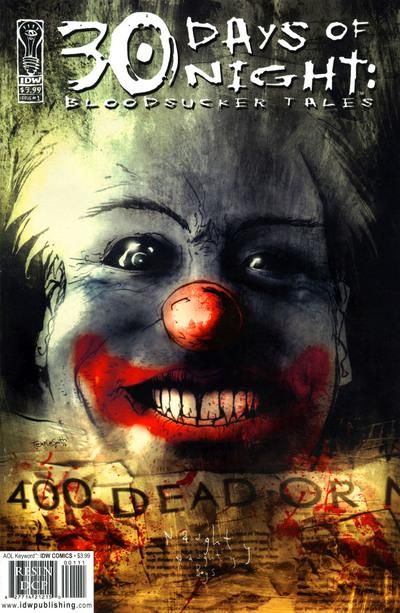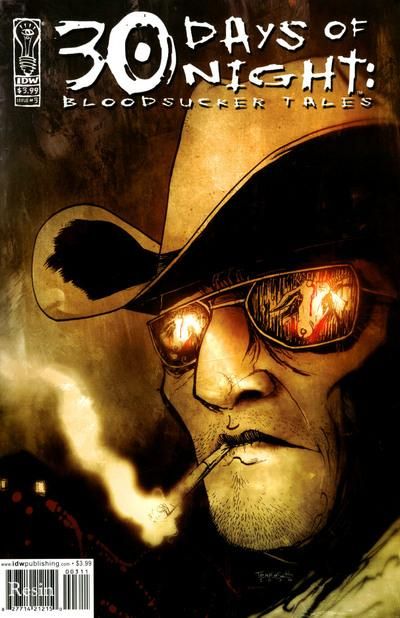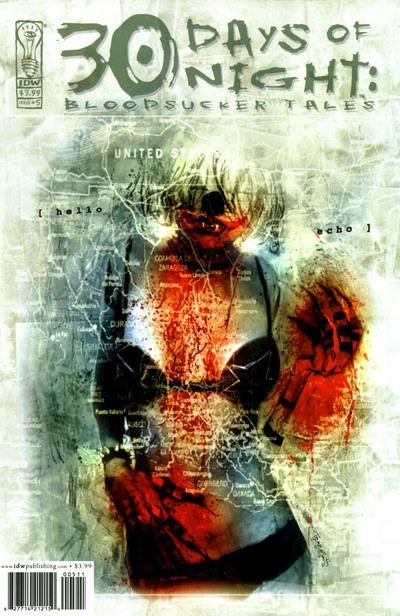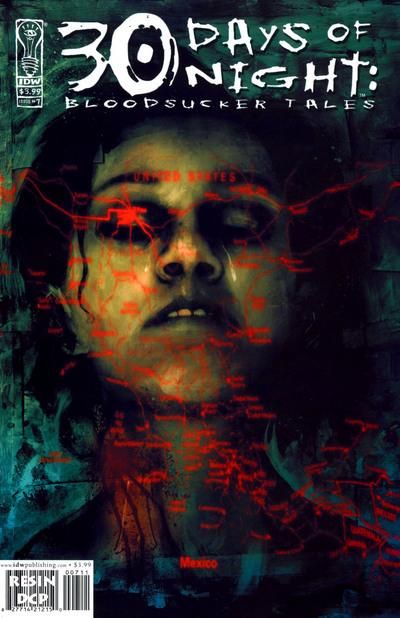Matt Fraction is currently writing a big crossover event for Marvel as Uncanny X-Men and Dark Avengers do the comic book version of the nasty this summer... But, I want to take you back to late 2004/early 2005 when such a thing seemed impossible, because who the hell is Matt Fraction? Spoilers, I'm sure.
"Juarez; Or, Lex Nova & the Case of the 400 Dead Mexican Girls" by Matt Fraction and Ben Templesmith was, what, Fraction's second attempt at serial comic book fiction? He had done the "Rex Mantooth" three-issue serial as part of Double Take (the other half being the final three parts of Joe Casey and Charlie Adlard's "Codeflesh"), but, besides that, I don't think he'd done anything in serial form. And even "Mantooth" was three self-contained stories whereas "Juarez" is an eight-part serial of 12 pages each. I suppose Fraction could have written it as a 96-page graphic novel, but it is structured very much in a serial way, especially the final chapter. "Juarez" was published in 2004/2005's 30 Days of Night: Bloodsucker Tales, which contained two serials in each issue and a short prose story. IDW was smart in that each of the serials featued one half of the 30 Days of Night creative team, Steve Niles writing the other one, which, I'll admit, is largely forgettable. I didn't reread it with "Juarez," because I don't have any memories beyond a vague feeling of 'not hating/not liking.'
This series is actually my only experience with 30 Days of Night and I bought the first issue exclusively because I wanted to support Matt Fraction. Back around this time, I read his Poplife column at CBR every week. Maybe I'd already read Last of the Independents and The Annotated Mantooth, but I can't say for sure. Doesn't matter. All I knew was, I liked what this guy had to say in his column (and maybe already liked what little comic work he'd done) and wanted to show my support by at least picking up the first issue of this series to see what's what. And I dug it, so I picked up the next seven. I've reread it maybe once since that time. In fact, it's been sitting in a pile of comics I've been meaning to reread for well over a year. That's not really a comment on its quality, because I'm sure most of you have similar piles. Stacks of movies, books, and comics you mean to get around to, but just never for whatever reason. During that time, you'll read the same book three times, but that stack remains. Is it because that other book is better? Perhaps, but it's also a question of mood. I'm a big believer in going where my mood points. That means I may spend a solid week listening to the same CD even though I spent a week listening to it two months prior or that I read the same books three times while I have a stack of Thomas Pynchon to get to, but that's how it goes. Nothing is worse than slogging through something simply because it's there. This is art and entertainment, folks, and you've gotta go with what you're feelin'.
Except when you're doing posts like these and need content. Oh ho ho, take that mood. Though, when I decided to do this story next, I hadn't even finished my post on The Monarchy, but found myself compelled to read "Juarez" right then and there. Manufactured mood! Hells yes.
That said, I enjoyed "Juarez," I suppose, but it didn't really wow me. It's not bad, but it's so clearly an early work that I hesitate to critique it. So much of it can be explained away by "It was Fraction's first attempt at a serialised story! Lay off the man!" And I can't really argue with that. But, let's see how things go anyway.
"Juarez; Or, Lex Nova & the Case of the 400 Dead Mexican Girls" is about Juarez, a small Mexican town where all of the young women seem to be dying/disappearing. No one knows how many, but we're in the 100-400 ballpark. Enter Lex Nova, a private detective who has come to town to solve the case. He befriends the town priest, pisses off the locals, and has a habit of narrating his case out loud. I didn't know it at the time (and if Fraction mentioned this in his column then I was really dense), but this is obviously Fraction aping Elliot Gould's Philip Marlowe from the Robert Altman adaptation of Raymond Chandler's The Long Goodbye where Gould portrays Marlowe as doing that as well. Though, Gould/Marlowe only mumbles his narration and not all of the time, while Lex Nova says it in his regular voice and doesn't seem aware that he's saying it out loud. It's a nice gag that Fraction gets as much mileage out of as one possibly can.
Thrown into this plot is the Zero Family Circus, a trio of vampires, Bingo, Echo, and Halo, who are in search of their lost patriarch, Uncle Zero. They travel to Juarez, assuming that 400 dead Mexican girls means that Uncle Zero has hit the town. All they find are the men who own the local factory and their decadent lifestyles -- and Lex Nova. We get the impression that the Zeros have a history with Lex Nova, but we don't find that out until chapter eight. Honestly, there isn't much to the plot and it's a little drawn out. The mystery is solved without any fanfare and, in the end, those responsible aren't really punished, but make amends. Of sorts.
What matters here is how "Juarez" is told with each chapter trying its best to introduce the concept, the characters, and advance the plot in 12 pages. In this regard, Fraction is usually successful. That he uses an eight-panel grid as his template helps quite a bit since you can get to the point pretty damn quickly when you've got eight-panel pages. Of course, not every page has eight panels, but it's a dense sort of grid that lends itself to conveying a lot of information in a short period of time.
Ben Templesmith is the real star here as he makes these pages sing. Not a lot of guys can deliver work of this calibre with eight-panel grids and "Juarez" reads like the warm-up run for Fell where he's doing the full nine-panel grid. I wouldn't be surprised if "Juarez" was where Warren Ellis saw just how good Templesmith can draw pages this dense (I wouldn't be surprised if that wasn't the case either). His work is exactly what you want it to be: outlandish, funny, dark, scary, and just plain fucked up. He doesn't just match Fraction, he goes past him. Then again, did you expect anything different?
Fraction's dialogue is noticeably off-beat and stylised, the sort of thing he'd do better in Casanova. If this reads like Templesmith's trial run for the grid of Fell, "Juarez" reads like Fraction's trial run for Casanova, trying to sustain a narrative over eight chapters, figuring out his voice as a writer. You can see a lot of his influences pretty explicitly, but that's okay. I think a lot of people get too down on novice writers who wear their influences on their sleeves, but copying the writers you admire is the only way to grow and eventually find your own voice. You pick and choose, see what works for you and what doesn't.
The narrative never really comes together since it's not a strong one. It's a clever one, sure, but the vampires just seem thrown in because there needs to be vampires. The Zero Family adds little to the actual plot and neither does Lex Nova being a vampire, too (although, one that can go out in the sun). Well, maybe, Lex as a vampire does, because it adds a level of corruption to him. He's not the White Knight that he wants to be, but, in the end, he is a hero by taking down the Zero Family. Except, the case is solved without them and in the shadows with hints that it's never over -- and all that's happened really is that a lot of girls have died and a family has been broken (if it were ever really together).
The Zero Family is an interesting set of characters. Echo is a mute, lacking a tongue, while Bingo is obviously trying to be the new 'dad' figure that Uncle Zero once was. We never find out why Uncle Zero left -- or where he went. When he makes an appearance in the final issue, we never get a clear picture of him. He's a mystery and one that's never solved. I wonder if Fraction ever had any intentions of returning to these characters.
The Mexicans in the story are mostly poor. The only one with any character is the priest, but even he is simply a man who's lost his faith but keeps up the facade for the community. He and Lex work together to stop the rich men. He's Lex's only friend and survives the whole mess.
I'm not sure what possessed Fraction to try and tell this in the eight-panel grid. While high-panel-count grids look easy, they're rather difficult to make work effectively. A six-panel grid probably would have been much more manageable and given a pacing more in line with the tone Fraction uses. The eight-panel grid is more formal and overwhelming. It is that 'wall of sound' effect that Fraction would try out later (again, seeds of future work without him knowing it). He uses a lot of silent panels, obviously experimenting with what a lack of dialogue can do for a scene. Sometimes, that extra beat helps; sometimes, it doesn't. It's a bold (and, honestly, amateurish) move to make trying something so formally demanding. But, hey, Fraction shows that he is without fear.
Remarkably, he does infuse the comic with a lot of energy despite the grid, which is very, very difficult. In that way, Templesmith and Fraction are a great team -- they're both high energy. A lot of what's great in "Juarez" is a result of the energy the two put into it, that kinetic feeling when they kick it into fourth and get moving. It doesn't happen too often, but scenes like Lex punching out a truck are a real thrill.
Fraction tries a bit too hard in "Juarez." The dialogue is too 'witty' or 'cool,' the characters a bit too 'out there' or 'edgy.' There isn't the right balance between that and the emotional sentiments that make Casanova so strong a work. He tries to get there, but can't. He almost reaches that level in the final chapter of the story. He comes very close.
It's hard not to draw comparisons to "Codeflesh" when looking at this story since it's obviously, somewhat, influenced by it (whether intentional on Fraction's part is questionable). Fraction was previously shared a book with that serial, both it and "Juarez" are eight chapters long, and, in each, the final chapter is, by far, the best, the most reveletory, the one that makes the whole damn thing better than it would be otherwise. In "Codeflesh," Casey and Adlard basically did a technical trick that is so damn perfect and wonderful that I'm still in awe of how well they pull it off. Here, Fraction and Templesmith don't go for broke in the same way, but give us a chapter titled "Alex Gorodetski & the Case of the 1 Missing White Girl -- Or -- The Beginning." In it, Alex Gorodetski, a shitty LA private detective is hired to find a missing girl, Olivia, and it leads him to the Zero Family Circus who have kidnapped Olivia. And it turns out that Olivia is in the process of being turned into a vampire -- who we'll recognise as Echo when Alex bites her tongue off. He's changed by the Zero Family, let go, albeit framed for the killings of the girls that the Zero Family have abducted/sucked dry. After he bites out the tongue, we also get the first instance of his narrating out loud since this issue has had narration in caption boxes.
The final page is chilling. It seems that he's been framed for the crimes of Zero Family and he encounters one of the prostitutes in his building, and she asks if what 'they' say is true -- and he responds by saying "No. I tried to save them." At which point, he breaks her neck and the issue ends with him holding her body, leaving the building (which is now on fire), and him saying, "My name is Lex Nova. / I find girls."
"Juarez" is an interesting read as it shows where Matt Fraction began and that he wasn't fantastic right out of the gate. While I adore his first work, collected in The Annotated Mantooth, that was some dumb comedy, whereas he's trying for a bit more here. He's obviously got some ambitions and we would see what those were over the following years. But, yeah, I still kind of dig this story despite it not holding together. That final chapter almost pulls it together, but it can't really explain away the loose plot that isn't that good. But, hey, give it a read if you can since early Fraction is still decent and Ben Templesmith is very good.





